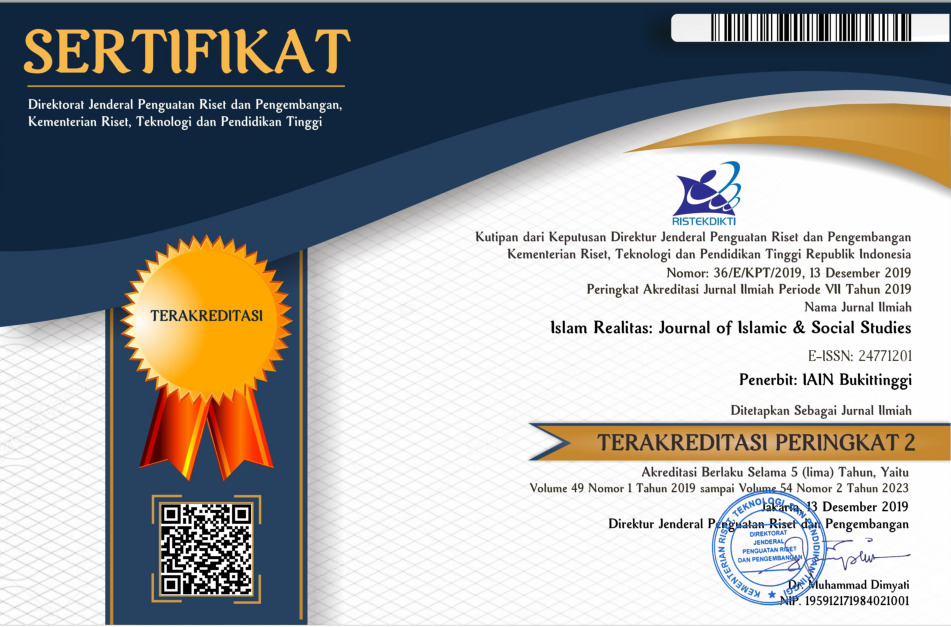Political Distrust and Islamic Populism: Study on Tarbiyah Community in Pemilu 2019
Downloads
This article aims to describe the extent to which Tarbiyah community distrust to the General Elections Committee (KPU) and the Indonesian government as well as factors causing this political distrust. Massive movements protesting and rejecting the result of the Pemilu (General Election) 2019 by supporters of one of the presidential candidates, Prabowo Subianto, were launch when the General Elections Committee (KPU) announced the victory of the incumbent, Joko Widodo. One of the most dominant groups involved in these protests was Tarbiyah community. The method used in this study is qualitative research method by conducting in-depth interviews of Tarbiyah members. The study found that political distrust among them is a symptom of Islamic populism. The Islamic populism imagines itself as the movement that can save Indonesian Muslims from corrupt elites.
Artikel ini berupaya menjelaskan sejauh mana ketidakpercayaan politik di kalangan komunitas Tarbiyah terhadap Komisi Pemilihan Umum (KPU) dan pemerintah serta faktor-faktor yang menyebabkannya. Gerakan masif yang memprotes dan menolak hasil Pemilu 2019 muncul di kalangan pendukung Prabowo Subianto (salah satu calon Presiden) ketika Komisi Pemilihan Umum (KPU) mengumumkan hasil Pemilu yang menegaskan kemenangan petahana, Joko Widodo (Presiden Indonesia pada periode 2014-2019). Salah satu kelompok yang paling dominan terlibat dalam protes ini adalah komunitas Tarbiyah. Studi yang menggunakan metode kualitatif ini mewawancarai secara mendalam anggota Tarbiyah. Studi ini menjelaskan bahwa ketidakpercayaan politik di kalangan komunitas Tarbiyah merupakan gejala populisme Islam. Populisme Islam mengimajinasikan dirinya sebagai gerakan yang berusaha menyelamatkan Muslim Indonesia dari para elit yang korup.Â
Book
Albertazzi, Daniele, and Duncan McDonald, ‘Introduction: The Sceptre and the Spectre’, in Twenty-First Century Populism: The Spectre of Western European Democracy, ed. by Daniele Albertazzi and Duncan McDonald (London: Palgrave MacMillan, 2008), pp. 1–11
Bryman, Alan, Social Research Methods, Third edit (Oxford: Oxford University Press, 2009)
Hadiz, Vedi R., Islamic Populism in Indonesia and the Middle East (Cambridge: Cambridge University Press, 2016)
Mietzner, Marcus, Reinventing Asian Populism: Jokowi’s Rise, Democracy, and Political Contestation in Indonesia (Hawai: East-West Center, 2015)
Mudde, Cas, and Cristobal Rovira Kaltwasser, Populism in Europe and the America: Threat or Corrective for Democracy (Cambridge: Cambridge University Press, 2012)
Putnam, Robert D., and Kristin A. Goss, 'Introduction', in Democracies in Flux: The Evolution of Social Capital in Contemporary Society (New York: Oxford University Press, 2004)
Thomas, G, How to Do Your Case Study: A Guide for Students and Researchers (Cambridge: Sage, 2011)
Journal
Arifianto, Alexander R., ‘What the 2019 Election Says about Indonesian Democracy’, Asia Policy, 14.4 (2019), 46–53
Arimbi, Diah Ariani, ‘Politicizing Piety: Women’s Rights and Roles in the Tarbiyah Movement in Indonesia’, Religious Studies and Theology, 36.2 (2017), 228–44
Aspinall, Edward, ‘Oligarchic Populism: Prabowo Subianto’s Challenge to Indonesian Democracy’, Indonesia, 99.1 (2015), 1–28
Aspinall, Edward, and Marcus Mietzner, ‘Indonesian Politics in 2014: Democracy’s Close Call’, Bulletin of Indonesian Economic Studies, 50.3 (2014), 347–69
Asyari, Suaidi, and M. Husnul Abid, ‘Expanding the Indonesian Tarbiyah Movement through Ta’aruf and Marriage’, Al-Jami’ah, 54.2 (2016), 337–68
Canovan, Margaret, ‘Trust the People! Populism and the Two Faces of Democracy’, Political Studies, 47.1 (1999), 2–16
Fuad, Ai Fatimah Nur, ‘Da’wa and Politics: Lived Experiences of the Female Islamists in Indonesia’, Contemporary Islam, 14.1 (2020), 19–47
Fukuoka, Yuki, and Luky Djani, ‘Revisiting the Rise of Jokowi: The Triumph of Reformasi or an Oligarchic Adaptation of Postclientelist Initiatives?’, South East Asia Research, 24.2 (2016), 204–11
Geurkink, Bram, Andrej Zaslove, Roderick Sluiter, and Kristof Jacobs, ‘Populist Attitudes, Political Trust, and External Political Efficacy: Old Wine in New Bottles?’, Political Studies, 68.1 (2020), 247–67
Hadiz, Vedi R., ‘A New Islamic Populism and the Contradictions of Development’, Journal of Contemporary Asia, 44.1 (2014), 125–43
Hamayotsu, Kikue, ‘The Political Rise of the Prosperous Justice Party in Post-Authoritarian Indonesia: Examining the Political Economy of Islamist Mobilization in a Muslim Democracy’, Asian Survey, 51.5 (2011), 971–92
Hamid, Abdul, ‘Jokowi’s Populism in the 2012 Jakarta Gubernatorial Election’, Journal of Current Southeast Asian Affairs, 33.1 (2014), 85–109
Hasan, Noorhaidi, ‘Islamist Party, Electoral Politics and Da’wah Mobilization among Youth: The Prosperous Justice Party (PKS) in Indonesia’, Journal of Indonesian Islam, 6.1 (2012), 17-47
Jalli, Nururrianti, and Ika Idris, ‘Fake News and Elections in Two Southeast Asian Nations: A Comparative Study of Malaysia General Election 2018 and Indonesia Presidential Election 2019’, 367.ICDeSA (2019), 138–48
Machmudi, Yon, ‘The Emergence of New Santri in Indonesia’, Journal of Indonesian Islam, 2.1 (2008), 69–102
Martini, Sergio, and Mariano Torcal, ‘Trust across Political Conflicts: Evidence from a Survey Experiment in Divided Societies’, Party Politics, 25.2 (2019), 126–39
Mietzner, Marcus, ‘Fighting Illiberalism with Illiberalism: Islamist Populism and Democratic Deconsolidation in Indonesia’, Pacific Affairs, 91.2 (2018), 261–82
Nisa, Eva F., ‘Social Media and the Birth of an Islamic Social Movement: ODOJ (One Day One Juz) in Contemporary Indonesia’, Indonesia and the Malay World, 46.134 (2018), 24–43
Nurdin, Ahmad Ali, ‘PKS’ Democratic Experiences in Recruiting Members and Leaders’, Al-Jami’ah: Journal of Islamic Studies, 49.2 (2011), 329–60
Rooduijn, Matthijs, and Tjitske Akkerman, ‘Flank Attacks: Populism and Left-Right Radicalism in Western Europe’, Party Politics, 23.3 (2017), 193–204
Salman, ‘The Tarbiyah Movement: Why People Join This Indonesian Contemporary Islamic Movement’, Studia Islamika, 13.2 (2006)
Volodin, Dmytro, ‘Deliberative Democracy and Trust in Political Institutions at the Local Level: Evidence from Participatory Budgeting Experiment in Ukraine’, Contemporary Politics, 25.1 (2019), 78–93
Zarkov, Dubravka, ‘Populism, Polarization and Social Justice Activism’, European Journal of Women’s Studies, 24.3 (2017), 197–201
Thesis and Dissertation
Mujani, Saiful, Religious Democrats: Democratic Culture and Muslim Political Participation in Post-Suharto Indonesia, (unpublished dissertation, Ohio: Ohio State University, 2003)
Interviews
Afif, (Pseudonym) Interview, {7 September 2021}
Anton, (Pseudoym) Interview, {25 September 2021.
Farahana, (seudonym) Interview, {3 September 2021}.
Rendi, (Pseudoym) Interview, {20 September 202}.
Siti, (Pseudon) Interview, {10 September 2021}.
Mamas, (Pseudnym) Interview, {7 September 2021}.
Agung, (Pseudonym) Interview, {23 September 2021}.
Authors who publish with this journal agree to the following terms:
- Authors retain copyright and grant the journal right of first publication with the work simultaneously licensed under a Creative Commons Attribution License that allows others to share the work with an acknowledgment of the work's authorship and initial publication in this journal.
- Authors are able to enter into separate, additional contractual arrangements for the non-exclusive distribution of the journal's published version of the work (e.g., post it to an institutional repository or publish it in a book), with an acknowledgment of its initial publication in this journal.
- Authors are permitted and encouraged to post their work online (e.g., in institutional repositories or on their website) prior to and during the submission process, as it can lead to productive exchanges, as well as earlier and greater citation of published work (See The Effect of Open Access).









